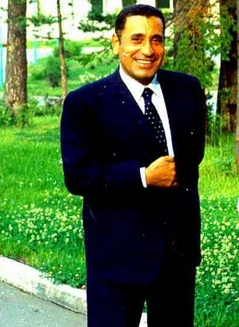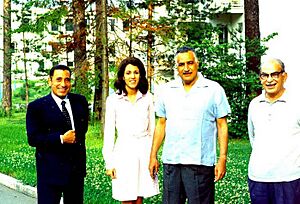Mohamed Hassanein Heikal facts for kids
Quick facts for kids
Mohamed Hassanein Heikal
|
|
|---|---|

Heikal in 1966
|
|
| Born | 23 September 1923 |
| Died | 17 February 2016 (aged 92) Cairo, Egypt
|
| Education | American University, Cairo |
| Occupation | Journalist |
| Years active | 1942–2003 |
| Spouse(s) | Hedayt Elwi Taymour (1955–2016, his death) |
| Children | 3 sons |
| Family | Heikal |
Mohamed Hassanein Heikal (Arabic: محمد حسنين هيكل; 23 September 1923 – 17 February 2016) was a very important Egyptian journalist. For 17 years, from 1957 to 1974, he was the main editor of the Cairo newspaper Al-Ahram. He also shared his thoughts on Arab issues for over 50 years.
Early in his career, Heikal helped explain the ideas of President Gamal Abdel Nasser. He even helped write for President Nasser. Heikal believed in something called pan-Arabism, which is the idea of Arab countries working together. He was also part of a political group called the Arab Socialist Union. In April 1970, he became the minister of information. However, he left the government in 1974 because he disagreed with President Anwar Sadat.
In September 2003, when he turned 80, Heikal wrote an article. He said it was time for an "old warrior" to stop writing and watch from the sidelines. Heikal explained that he wouldn't disappear. Instead, he would observe things more closely. In his article, he also shared many stories from his life. These included his first reporting job during the Second Battle of El Alamein in 1942. He also wrote about his friendship with Nasser and his relationship with Sadat.
In 2007, Heikal talked with a British journalist named Robert Fisk. Heikal spoke about Egypt and criticized President Mubarak. He said Mubarak lived in a "world of fantasy." These comments caused a big stir in Egypt. Later, on Al Jazeera, Heikal said he stood by his words. He added that Mubarak had not entered politics until very late, meaning he lacked experience.
Contents
Mohamed Heikal's Life Story
Mohamed Hassanein Heikal was born in Cairo, Egypt. His family were wealthy merchants who sold wheat. Mohamed was the oldest son and was trained to manage the family business. However, he wanted to get a good education. He studied at the respected American University in Cairo.
Early Career in Journalism
During World War II, after finishing college, Heikal started his career in journalism. He worked at the Egyptian Gazette, a newspaper funded by the British. He became its editor in 1943. Famous English writers like George Orwell also wrote for this newspaper.
Throughout his career, Heikal often criticized the military governments of Anwar Sadat and Hosni Mubarak. He felt they had moved away from Nasser's original dream for Egypt.
Reporting on Major Events
Heikal reported on the First Arab-Israeli War when Israel was created. He was also in Cairo when the Free Officers took control in 1952. During this time, he quickly became friends with Gamal Abdel Nasser, who was part of the group.
As editor of Al-Ahram, Heikal became known for his investigative reporting. He was seen as a strong and reliable voice. The Washington Post newspaper called him "the voice of Egypt" and a "window on a secretive regime." Heikal often traveled across the Middle East to report on conflicts. He strongly supported Arab unity after the war. Nasser dreamed of a united Arab republic across the region.
From 1957 to 1974, Heikal wrote a popular weekly column called Bi-Saraha. In this column, he spoke openly about Nasser's policies. He was also a member of the Arab Socialist Union Party. For a short time, he even served as foreign minister under Nasser.
Changes with Sadat and Mubarak
Heikal's feelings changed with Nasser's successors. President Sadat made a big decision in the 1970s. He decided to recognize Israel and agree to its borders. Sadat wanted peace. Heikal and other older supporters of Nasser were against any peace talks with Israel.
In 1974, Sadat removed Heikal from his position. Heikal faced difficulties and was put in prison for a time. Sadat's death was a setback for Arab-Israeli relations. It led to a time when Egypt focused more on security. Heikal wrote a book called Autumn of Fury (1982) about these events.
President Mubarak focused more on security and law and order. He continued Sadat's policy of working with Western countries. Heikal saw this as a return to old colonial ways. Heikal then joined Al-Jazeera Television in Qatar. There, he could comment on the Gulf War and other conflicts from an Islamic point of view. In 1996, he published an important book called Secret Channels. It told the story of the Oslo Peace Accords in 1993, which aimed to end the war in Palestine.
Later, Heikal criticized Mubarak in his book Mubarak and His Time. He called Mubarak "unskilled and dishonest." In his final years, Heikal suffered from kidney disease. He passed away at the age of 92 from kidney failure.
Al Jazeera Lectures

Heikal gave a series of lectures on Al Jazeera television. This gave him a bigger platform in the Arab world. His lectures were broadcast every Thursday evening. In these talks, he often shared information he had gathered during his many years as a journalist and historian. He also spoke about his role in Egypt's modern political history.
His lectures covered many topics. He talked about the fall of the Ottoman Empire and the rise of modern Arab nationalist governments. He also lectured on the rise of the American Empire and the decline of older powerful nations. His talks ranged from general overviews to very specific details of events he had seen. He also discussed how Nasser's relationship with the Egyptian Muslim Brotherhood became difficult.
2007 Al Jazeera Lecture Topics
- Challenges in Building the Aswan Dam
- Aswan Dam and the National Project
- The United States and the Arab/Israeli Conflict
- Slipping into War
- Palestinians and Prospects of Settlement with Israel
- Israeli Thinking and the 1956 Events
- Conspiracy and Coup Era
- French Plans to Interfere in Egypt
- Creative Chaos and the Rivalry Links
- Conspiracy Theory
- Nasser's Debates with the West
- Prospects of Settlement in the Middle East (2)
- Prospects of Settlement in the Middle East (1)
- Nasser's Ultimate Test
- Jordan's 1956 Storm
- Behind the Arms Deal
- Security and National Peace
- Arms Deals in the Arab World
- Geneva Convention and the Importance of 1955
- Bandong Convention
- Preparing for Plan Alpha
- Israeli Penetration in the Region
- Nasser's Meeting with UK's Foreign Secretary
- 1955 and the Arab Division
- 1955 and the Distinguishing Symbols
2008 Al Jazeera Lecture Topics
- Mine in the Aqaba Gulf
- Israel's Nuclear Weapons
- Politics and History
- World on the Verge of Chaos
- World Foreign and Internal Politics
- Understanding of War in Nations
- Arab Resistance and Aid
- War Era: Strategy and Politics
- Arab False Battles
- Instance of True Revolution
- America Leads the World
- Palestine: Right Refuses to be Forgotten (2)
- Palestine: Right Refuses to be Forgotten (1)
- Israel's View on Egyptian Role in the Region
- Series of Crises in the Time of War
- The Naked Empire
- Alliance of Empires
- Monsters With Eight Heads
- Egyptian Armament and Israel's Security
- Decision Projects Associated with Suez
- Suez War
- Conspiracy Theory
- National Security Boundaries
- Protecting Suez Canal
- Seven Plans to Invade
- Suez Battle and War Era
- Truth of Wars the Arabs Fought
- National Security Theories
- Arriving Tremors
- War Era
Mohamed Heikal's Books
Heikal wrote many books during his career. Here are some of them:
- (1973) The Cairo Documents: The Inside Story of Nasser and His Relationship with World Leaders, Rebels, and Statesmen
- (1975) The Road to Ramadan
- (1978) Sphinx and Commissar: The rise and fall of Soviet influence in the Arab world
- (1980) October War
- (1981) The Return of the Ayatollah: The Iranian Revolution from Mossadeq to Khomeini
- (1982) Iran: The Untold Story
- (1983) Autumn of Fury: The Assassination of Sadat – In this book, he looked at why Sadat was assassinated and how political Islam grew.
- (1986) Cutting the Lion's Tale: Suez Through Egyptian Eyes
- (1993) Illusions of Triumph: An Arab View of The Gulf War
- (1996) Secret Channels: The Inside Story of Arab-Israeli Peace Negotiations
Awards and Honours
Mohamed Hassanein Heikal received many awards for his work.
Egyptian Awards
Awards from Other Countries
 1st class of the National Order of Merit (Algeria) (Algeria)
1st class of the National Order of Merit (Algeria) (Algeria) 1st class of the Order of Merit (Lebanon) (Lebanon)
1st class of the Order of Merit (Lebanon) (Lebanon) Grand cordon of the Order of Ouissam Alaouite (Morocco)
Grand cordon of the Order of Ouissam Alaouite (Morocco) Grand cordon of Order of Civil Merit of the Syrian Arab Republic (Syria)
Grand cordon of Order of Civil Merit of the Syrian Arab Republic (Syria)
See also
 In Spanish: Mohamed Hassanein Heikal para niños
In Spanish: Mohamed Hassanein Heikal para niños
 | Precious Adams |
 | Lauren Anderson |
 | Janet Collins |

